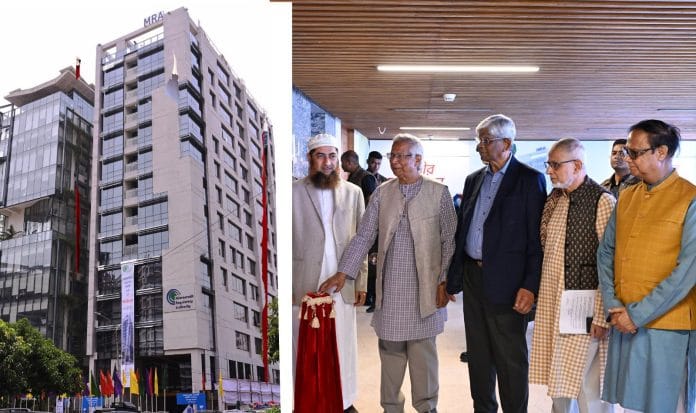Chief Adviser Prof Muhammad Yunus has called for a paradigm shift in the way microcredit is structured, urging stakeholders to move beyond the traditional NGO framework and embrace a full-fledged banking model to better serve borrowers, says CA’s press wing.
Speaking at the inauguration of the new headquarters of the Microcredit Regulatory Authority (MRA) in Agargaon, Dhaka, on Saturday, the Chief Advisor emphasized the need for dedicated legislation to govern the microcredit sector.
“Microcredit must no longer be viewed merely as an NGO operation. It needs to function with the mindset and structure of a bank,” said Professor Yunus. “If it remains stuck in the NGO mindset, it will never achieve the maturity and credibility of formal banking. This sector deserves its own law,” he said.
Reflecting on the early days of Grameen Bank, Yunus recounted challenges they faced when advocating that their institution be recognized as a “real bank.” “We argued that our model, which is trust-based and collateral-free, is the true essence of banking, unlike the traditional banks which operate on distrust,” he said.
He sharply criticized traditional banks, noting, “Today, many of those so-called real banks are bankrupt or embroiled in corruption scandals. Meanwhile, microcredit institutions have maintained financial discipline and integrity—no one has fled with the money. That’s the irony.”
Professor Yunus asserted that microcredit represents the future of banking, grounded in human trust rather than capital. “The banking of tomorrow will operate on identity and trust, not merely on money.”
On the need for a dedicated regulatory body, Yunus shared how Grameen Bank’s success inspired many NGOs to launch similar initiatives—some deviating from the core principles. This prompted the idea for a separate regulator. “We approached Bangladesh Bank, but they initially said it wasn’t their responsibility. Later, we convinced the Finance Ministry, and eventually, Dr. Fakhruddin Ahmed supported the idea, although it took some persuasion to establish it outside the purview of Bangladesh Bank,” he explained.
Using a metaphor, Yunus said, “Grameen Bank and traditional banks are both banks, just as American football and European football are both sports. But they are played differently. Trying to regulate microcredit with traditional banking rules would have been disastrous.”
He applauded MRA and Bangladesh Bank officials for their efforts in understanding and developing regulations suited for the microcredit sector. “Had they imposed conventional banking regulations, microcredit would have disappeared.”
He further highlighted how Bangladesh’s microcredit regulatory model has served as a blueprint for other nations. “Many countries have struggled with the question of who should regulate microcredit. I told them repeatedly—look at Bangladesh. Our solution is internationally relevant.”
Former Bangladesh Bank governor and economic advisor Dr. Salehuddin Ahmed stressed the importance of making regulations user-friendly. “MRA must not only regulate but also promote. Regulations should be enabling, not burdensome. Service charges and savings returns must be made simpler and more transparent,” he said.
Bangladesh Bank Governor Dr. Ahsan H. Mansur shared striking data about the sector’s growth. “Microcredit institutions now hold resources equivalent to 10% of the banking sector. Members’ savings have exceeded Tk 6.8 trillion, and cumulative surplus stands at over Tk 6.1 trillion. This growth is largely self-driven, with minimal reliance on foreign aid.”
He noted the expanding reach of microfinance and agent banking in rural areas. “With around 26,000 microcredit branches and over 20,000 agent banking outlets, we are seeing healthy competition. The formal sector is increasingly integrating with rural economies. Microfinance institutions must adapt and remain competitive.”
Dr. Mansur confirmed that a draft law to strengthen the regulatory framework for microcredit has been prepared and will soon be submitted to the government.
The event was also attended by Dr. M. Anisuzzaman Chowdhury, Special Assistant to the Chief Advisor, among other dignitaries.

